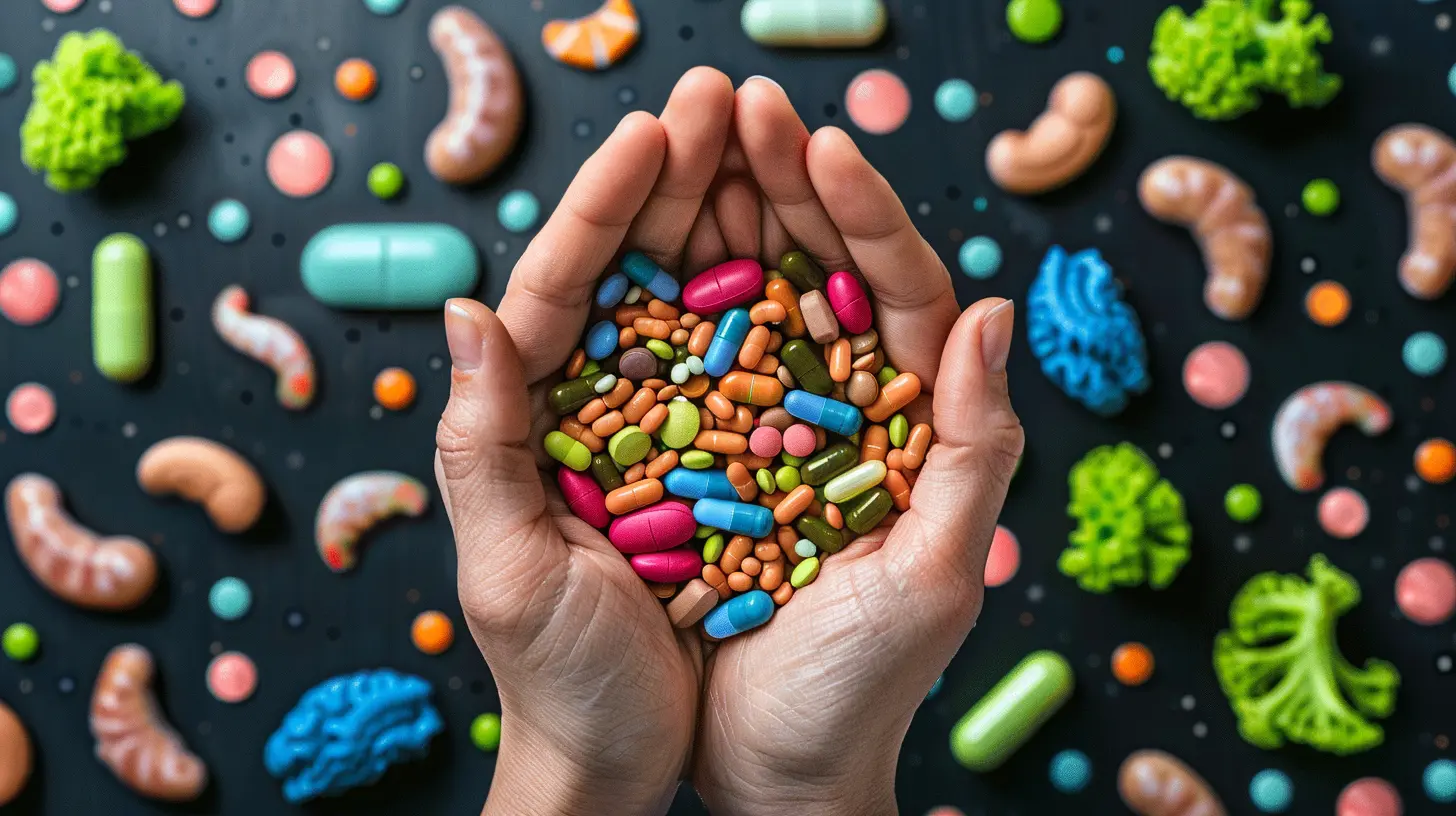Signs Your Gut Microbiome Might Be Out of Balance
8 September 2025
The human body is a universe of its own, filled with mysteries that science is only beginning to unravel. One of the most fascinating is the gut microbiome—a bustling metropolis of trillions of bacteria, fungi, and other microbes that reside in your digestive tract. These tiny inhabitants hold the key to your overall health, influencing digestion, immunity, mood, and even your weight.
But what happens when this delicate ecosystem falls out of balance? The signs can be subtle, yet their impact on your well-being can be profound. Could your gut microbiome be crying out for help? Let’s take a deep dive into the warning signals your body may be sending you. 
1. Persistent Digestive Issues
Does your stomach often feel like a brewing storm? If you're constantly dealing with bloating, gas, diarrhea, constipation, or acid reflux, your gut microbes might be in distress.A balanced microbiome ensures smooth digestion, breaking down food efficiently and keeping things moving. But when harmful bacteria outnumber the beneficial ones, digestion can become a nightmare. Think of it like a traffic jam in your intestines—everything slows down, causing discomfort and irregularity.
What You Might Experience:
- Frequent bloating, especially after meals- Sudden, unexplained food intolerances
- Episodes of constipation or diarrhea that seem random
- Acid reflux that comes out of nowhere
If your gut is constantly rebelling, it's time to investigate what’s really going on beneath the surface. 
2. Unexplained Weight Changes
Struggling to lose weight despite eating healthy? Or maybe you're gaining pounds without changing your diet? Your gut health might be the hidden culprit.Your microbiome plays a crucial role in how your body absorbs nutrients and stores fat. When the balance is off, your metabolism can slow down or spike unexpectedly. Some bacteria extract more calories from food, while others influence hormones that regulate hunger. In short, your gut could be making weight management harder than it needs to be.
Signs to Look Out For:
- Unintended weight gain without increasing calorie intake- Sudden weight loss despite eating normally
- Constant cravings for sugar and processed foods
If your body’s weight regulation seems off, your gut bacteria might be pulling the strings behind the scenes. 
3. Frequent Sugar Cravings
Ever feel like you NEED that chocolate bar or can’t resist that late-night ice cream? Your gut microbes might be influencing your cravings more than you think.Certain harmful bacteria thrive on sugar, and when they take over your microbiome, they send signals to your brain demanding more of it. It’s like having tiny sugar-addicted gremlins inside you, dictating your food choices.
How It Manifests:
- Intense sugar cravings, especially late at night- Feeling unsatisfied unless you eat something sweet
- Crashes in energy levels after eating sugary foods
If you’re constantly reaching for sweets, your gut might be out of alignment—and those bacteria are calling the shots. 
4. Low Energy and Constant Fatigue
Feeling drained no matter how much sleep you get? Your gut health could be the missing puzzle piece.A struggling microbiome can disrupt nutrient absorption, meaning your body isn’t getting the energy it needs. Worse, an imbalanced gut can trigger inflammation, which takes a toll on overall energy levels. Think of it as a faulty power grid—your body isn’t receiving the steady energy supply it needs to function optimally.
Warning Signs:
- Chronic fatigue despite a full night's sleep- Brain fog and sluggish thinking
- Feeling physically exhausted even with no strenuous activity
If you're constantly running on empty, your gut may be depleting your energy reserves.
5. Mood Swings, Anxiety, and Depression
Believe it or not, your gut and brain are in constant communication via the gut-brain axis. When your gut is out of balance, your mental health can suffer too. Around 90% of serotonin—the "feel-good" hormone—is produced in the gut. So when your microbiome is off-kilter, mood disorders can creep in.Red Flags to Watch:
- Frequent anxiety or panic attacks- Unexplained mood swings or irritability
- Symptoms of depression or chronic stress
If your emotions feel like a rollercoaster, it's worth asking—could your gut bacteria be playing with your mind?
6. Frequent Skin Problems
Your skin is often a reflection of what’s happening inside your body. If your gut health is suffering, it can show up as acne, eczema, rosacea, or other inflammatory skin conditions.An unhealthy gut can lead to increased inflammation throughout the body, which often manifests through breakouts or rashes. It’s almost like your skin is acting as a distress signal, warning you that something deeper is out of sync.
Common Skin Issues Linked to Gut Health:
- Persistent acne breakouts- Eczema flare-ups that seem random
- Red, inflamed skin or rosacea
If your skin is acting up without a clear cause, your gut might be asking for attention.
7. Weakened Immune System
Do you get sick often? A compromised gut microbiome can weaken your immune system, making you more vulnerable to infections, allergies, and even autoimmune conditions.Roughly 70% of your immune system resides in your gut, acting as your body’s first line of defense against pathogens. When the balance of good and bad bacteria is off, your immune response can become sluggish, leaving you open to frequent colds, infections, and other illnesses.
Warning Signs:
- Catching colds more often than usual- Recurrent infections that won’t go away
- Seasonal allergies worsening over time
If you’re constantly battling sickness, your gut microbiome may need urgent care.
8. Bad Breath (Even with Good Oral Hygiene)
Brushing, flossing, and using mouthwash religiously but still dealing with bad breath? Your gut could be to blame.Imbalances in gut bacteria can lead to the overgrowth of harmful microbes that produce foul-smelling gases. These can travel up the digestive tract and cause persistent halitosis, no matter how much gum you chew.
Signs Your Gut Might Be the Culprit:
- Bad breath that doesn’t improve with oral care- A constant sour or metallic taste in your mouth
- Frequent burping or acid reflux
If your breath has been a recurring problem, your gut might need a reset.
Ways to Restore Gut Balance
Now that you know the warning signs, the next question is—how do you fix it? The good news is that small changes can make a huge difference.✅ Increase Probiotic-Rich Foods
Incorporate more yogurt, kefir, sauerkraut, kimchi, and other fermented foods that promote healthy gut bacteria.✅ Eat More Fiber
Prebiotic fiber (found in garlic, onions, bananas, and asparagus) feeds good bacteria, helping them thrive.✅ Cut Back on Sugar and Processed Foods
Sugar fuels bad bacteria, so reducing processed foods can help rebalance your microbiome.✅ Stay Hydrated
Drinking plenty of water supports digestion and helps maintain a healthy gut lining.✅ Manage Stress
Chronic stress negatively impacts gut health. Practices like meditation, deep breathing, and exercise can keep both your mind and microbiome in check.✅ Get Enough Sleep
Sleep deprivation can throw off your gut bacteria, so aim for quality rest every night.Final Thoughts
Your gut microbiome is like a hidden control center, quietly orchestrating your health behind the scenes. When it’s in balance, you feel energized, clear-headed, and resilient. But when it’s off, your body sends distress signals—digestive problems, mood swings, fatigue, and more.Listen to these warning signs. Your body is always communicating; you just have to pay attention. Small dietary and lifestyle changes can make a world of difference in restoring your gut health and, ultimately, improving your overall well-being.
So, is your gut trying to tell you something?
all images in this post were generated using AI tools
Category:
Bowel HealthAuthor:

Sophia Wyatt
Discussion
rate this article
1 comments
Melody Wade
Fascinating insights! I love learning about the gut's role in overall health. Can't wait to explore how to restore balance!
September 10, 2025 at 4:31 PM

Sophia Wyatt
Thank you! I'm glad you found the insights helpful. Restoring gut balance is key to health—happy exploring!


